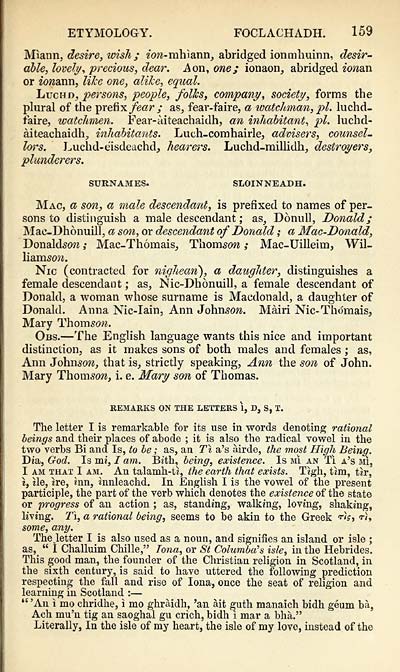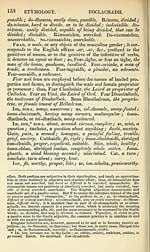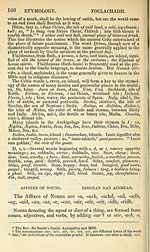Books and other items printed in Gaelic from 1841 to 1870 > Stéidhean a' Ghràmair Ghaëlig
(187) Page 159
Download files
Complete book:
Individual page:
Thumbnail gallery: Grid view | List view

ETYMOLOGY.
FOCLACHADH. 159
Mìann, desire, wisli ; zcm-mhìann, abridged ionmhuinn, desir-
aòle, lovely, precious, dear. Aon, one; ionaon, abridged iomn
or scwann, Wce one, aliJce, equal.
Luciib, persons, people, folJcs, company, society, forms the
plural of the prefix fear ; as, fear-faire, a watcJtman, pl. luchd-
faire, watcJimen. Fear-àiteachaidh, an inJiabitant, pl. luchd-
àiteachaidh, inJiabitants. Luch-comhairle, advisers, counsel-
lors. Luchd-e'isdeachd, hearers. Luchd-millidh, destroyers,
plunderers.
SURNAMES. SLOINNEADH.
Mac, a son, a male descendant, is prefixed to names of per-
sons to distinguish a male descendant; as, Dònull, Donald;
Mac-Dhònuill, a son, or descendant of Donald ; a Mac-Donald,
Donaldsow ; Mac-Thòmais, Thomsow ; Mac-Uilleim, Wil-
liams<m.
Nic (contracted for nigJiean), a daugJiter, distinguishes a
female descendant ; as, Nic-Dhònuill, a female descendant of
Donald, a woman whose surname is Macdonald, a daughter of
Donald. Anna Nic-Iain, Ann Johmo^. Màiri Nic-Thdmais,
Mary Thomscm.
Obs. — The English language wants this nice and important
distinction, as it makes sons of both males and females ; as,
Ann Johnson, that is, strictly speaking, Ann the son of John.
Mary Thomson, i. e. Mary son of Thomas.
REMARKS ON THE LETTERS ì, D, S, T.
The letter I is remarkable for its use in words denoting rational
beings and their places of abode ; it is also the radical vowel in the
two verbs Bi and Is, to be ; as, an Tì a's àirde, the most High Being.
Dia, God. Is mi, I am. Bith, being, existence. Is mì an Tì a's mi,
I am that I am. An talamh-tì, the earth that exists. Tìgh, tìm, tìr,
ì, ìle, ìre, ìrm, ìnnleachd. In English I is the vowel of the present
participle, the part of the verb which denotes the existence of tne state
or progress of an action ; as, standmg, walking, loving, shaking,
Kving. T\, a rational being, seems to be akin to the Greek f'Sj t<»
some, any.
The v letter I is also used as a noun, and signifi.es an island or isle ;
as, " I Challuim Chille," lona, or St Cotumba's isle, in the Hebrides.
This good man, the founder of the Christian religion in Scotland, in
the sixth century, is said to have uttered the following prediction
respecting the fall and rise of Iona, once the seat of religion and
learning in Scotland : —
" 'An ì mo chridhe, ì mo ghràidh, 'an àit guth manaich bidh gèum bà,
Ach mu'n tig an saoghal gu crìch, bidh ì mar a bhà."
Literally, In the isle of my heart, the isle of my love, instead of the
FOCLACHADH. 159
Mìann, desire, wisli ; zcm-mhìann, abridged ionmhuinn, desir-
aòle, lovely, precious, dear. Aon, one; ionaon, abridged iomn
or scwann, Wce one, aliJce, equal.
Luciib, persons, people, folJcs, company, society, forms the
plural of the prefix fear ; as, fear-faire, a watcJtman, pl. luchd-
faire, watcJimen. Fear-àiteachaidh, an inJiabitant, pl. luchd-
àiteachaidh, inJiabitants. Luch-comhairle, advisers, counsel-
lors. Luchd-e'isdeachd, hearers. Luchd-millidh, destroyers,
plunderers.
SURNAMES. SLOINNEADH.
Mac, a son, a male descendant, is prefixed to names of per-
sons to distinguish a male descendant; as, Dònull, Donald;
Mac-Dhònuill, a son, or descendant of Donald ; a Mac-Donald,
Donaldsow ; Mac-Thòmais, Thomsow ; Mac-Uilleim, Wil-
liams<m.
Nic (contracted for nigJiean), a daugJiter, distinguishes a
female descendant ; as, Nic-Dhònuill, a female descendant of
Donald, a woman whose surname is Macdonald, a daughter of
Donald. Anna Nic-Iain, Ann Johmo^. Màiri Nic-Thdmais,
Mary Thomscm.
Obs. — The English language wants this nice and important
distinction, as it makes sons of both males and females ; as,
Ann Johnson, that is, strictly speaking, Ann the son of John.
Mary Thomson, i. e. Mary son of Thomas.
REMARKS ON THE LETTERS ì, D, S, T.
The letter I is remarkable for its use in words denoting rational
beings and their places of abode ; it is also the radical vowel in the
two verbs Bi and Is, to be ; as, an Tì a's àirde, the most High Being.
Dia, God. Is mi, I am. Bith, being, existence. Is mì an Tì a's mi,
I am that I am. An talamh-tì, the earth that exists. Tìgh, tìm, tìr,
ì, ìle, ìre, ìrm, ìnnleachd. In English I is the vowel of the present
participle, the part of the verb which denotes the existence of tne state
or progress of an action ; as, standmg, walking, loving, shaking,
Kving. T\, a rational being, seems to be akin to the Greek f'Sj t<»
some, any.
The v letter I is also used as a noun, and signifi.es an island or isle ;
as, " I Challuim Chille," lona, or St Cotumba's isle, in the Hebrides.
This good man, the founder of the Christian religion in Scotland, in
the sixth century, is said to have uttered the following prediction
respecting the fall and rise of Iona, once the seat of religion and
learning in Scotland : —
" 'An ì mo chridhe, ì mo ghràidh, 'an àit guth manaich bidh gèum bà,
Ach mu'n tig an saoghal gu crìch, bidh ì mar a bhà."
Literally, In the isle of my heart, the isle of my love, instead of the
Set display mode to:
![]() Universal Viewer |
Universal Viewer | ![]() Mirador |
Large image | Transcription
Mirador |
Large image | Transcription
Images and transcriptions on this page, including medium image downloads, may be used under the Creative Commons Attribution 4.0 International Licence unless otherwise stated. ![]()
| Rare items in Gaelic > Books and other items printed in Gaelic from 1841 to 1870 > Stéidhean a' Ghràmair Ghaëlig > (187) Page 159 |
|---|
| Permanent URL | https://digital.nls.uk/101713843 |
|---|
| Description | Out-of-copyright books printed in Gaelic between 1631 and 1900. Also some pamphlets and chapbooks. Includes poetry and songs, religious books such as catechisms and hymns, and different editions of the Bible and the Psalms. Also includes the second book ever published in Gaelic in 1631. |
|---|

